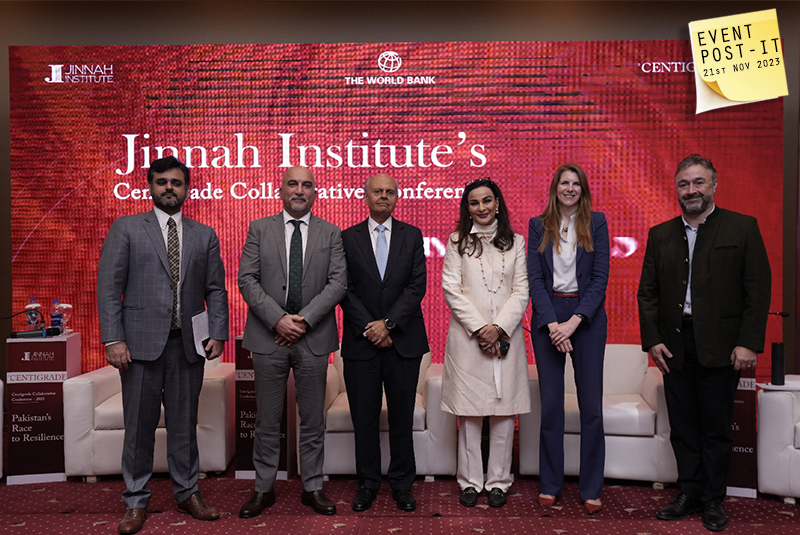Centigrade
Centigrade Collaborative Conference: Pakistan’s Race to Resilience
Date: November 27, 2023
Senator Sherry Rehman called for urgent action to combat climate change and its profound impact on Pakistan at a national conference organized by the Jinnah Institute in Islamabad. The conference titled, ‘Pakistan’s Race to Resilience’ was held in collaboration with the World Bank on November 21, 2023, under the Centigrade Platform. Senator Rehman emphasized the demand for interventions must go beyond mere government policies.
She further stated, “The one thing that needs doing for mitigation, adaptation or being more impactful, both socially and publicly, is the transfer of resources from north to south and making it happen beyond loss and damage funds.”
Aside from Senator Rehman’s keynote speech, two-panel discussions also took place at the conference for immersive knowledge sharing and advocacy on climate finance and local adaptation. The objective of this conference was to complement Pakistan’s preparation in the lead-up to COP28, as well as drive the critical national debate on Pakistan’s urgent adaptation needs.
The first panel discussion, moderated by Jinnah Institute’s Director of Programs, Salman Zaidi, focused on climate finance. Speaking during the panel, Najy Benhassine, World Bank’s Country Director for Pakistan, mentioned the need to transform agriculture, address water scarcity, and improve education to counter the impacts of climate change. He highlighted the insufficiency of available instruments and new approaches in comparison to the magnitude of the challenges.
H.E. Jane Marriott, British High Commissioner Pakistan, discussed the urgency of climate financing for Pakistan and acknowledged the country’s global leadership in addressing climate issues. The importance of making adaptation projects financially viable, bridging the funding gap through domestic sources, and effective engagement with international financial institutions were highlighted by her. Moreover, she stressed the risks and potential of carbon markets, called for effective coordination in government and donor efforts, and advocated for transformative environmental ideas in policies.
Ehsan Malik, CEO of Pakistan Business Council, agreeing with the need for internal private financing, highlighted the dichotomy within Pakistan’s private sector. He shed light on the agricultural sector’s struggles, with small-scale farmers unable to adopt sustainable practices. He proposed corporate farming as a beacon of modernization and efficiency, capable of catalyzing change across the industry. Most importantly, he advocated the promotion of gender diversity in businesses by encouraging women to take on leadership roles and beyond board representation for impactful change.
Additional Secretary of the Ministry of Climate Change, Mujtaba Hussain, stressed the pivotal role of the Ministry of Climate Change as a facilitator, emphasizing the necessity of a unified strategy to tap into climate finance. He prescribed the importance of a coordinated effort among ministries and the need for a clear understanding of roles and responsibilities. Lastly, He viewed the development of a carbon policy as a potential game-changer for Pakistan in meeting international obligations.
The second panel discussion on local adaptation explored the role of communities in building resilience to climate change. Afia Salam, the journalist, underlined the importance of adaptation and resilience in communities facing climate change impacts. She signified the importance of data-driven decision-making and governance reforms to address climate risk. She concluded that the call to action involves raising awareness, utilizing data effectively, and advocating for responsive governance at all levels.
An environmentalist and a lawyer, Rafay Alam, highlighted the urgency of addressing climate change through mitigation and adaptation, stressing the record-breaking temperature anomalies and the increasing challenges ahead. He proposed the need for transformative thinking in adapting to climate change, out-of-the-box solutions, and envisioning a shift towards industries.
Sobiah Becker, a climate advisor, emphasized the importance of indigenous knowledge and the pivotal dimensions of governance in developing adaptation strategies. She highlighted the importance of local knowledge and community participation within the national adaptation plan. She accentuated the need to break out of political and vertical silos, to have enabling and conducive climate policies that can be translated from federal to provincial level and to have robust data and frame policies accordingly.
Samuel Rizk, the Resident Representative of UNDP Pakistan, mentioned the importance of governance in climate change adaptation, discussing the political and social contracts that underpin effective responses. He advocated for people-centred approaches, calling attention to challenges like efficiency, effectiveness, and the need for greater commitment.
Overall, the insightful discussions emphasized not only the urgency of climate financing but also the crucial role of communities, governance reforms, and innovative solutions in building resilience.

